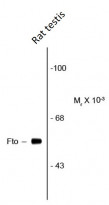ARG52285
anti-Fatso antibody [5-2H10]
anti-Fatso antibody [5-2H10] for ICC/IF,Western blot and Human,Mouse,Rat
Cell Biology and Cellular Response antibody; Metabolism antibody; Neuroscience antibody
Overview
| Product Description | Mouse Monoclonal antibody [5-2H10] recognizes Fatso |
|---|---|
| Tested Reactivity | Hu, Ms, Rat |
| Predict Reactivity | Bov, Dog, Hrs, NHuPrm, Sheep |
| Tested Application | ICC/IF, WB |
| Host | Mouse |
| Clonality | Monoclonal |
| Clone | 5-2H10 |
| Isotype | IgG |
| Target Name | Fatso |
| Antigen Species | Human |
| Immunogen | Synthetic peptide corresponding to amino acid residues from the N-terminal region conjugated to KLH |
| Conjugation | Un-conjugated |
| Alternate Names | EC 1.14.11.-; Alpha-ketoglutarate-dependent dioxygenase FTO; Fat mass and obesity-associated protein; ALKBH9 |
Application Instructions
| Application Suggestion |
|
||||||
|---|---|---|---|---|---|---|---|
| Application Note | Specific for the ~58 kDa Fto protein in Western blots of Rat testes lysate. The antibody has also been used for immunocytochemistry with neuronal progenitor cells. * The dilutions indicate recommended starting dilutions and the optimal dilutions or concentrations should be determined by the scientist. |
Properties
| Form | Liquid |
|---|---|
| Purification | Protein G purified |
| Buffer | 10 mM HEPES (pH 7.5), 150 mM NaCl, 0.1 mg/ml BSA and 50% Glycerol |
| Stabilizer | 0.1 mg/ml BSA, 50% Glycerol |
| Storage Instruction | For continuous use, store undiluted antibody at 2-8°C for up to a week. For long-term storage, aliquot and store at -20°C. Storage in frost free freezers is not recommended. Avoid repeated freeze/thaw cycles. Suggest spin the vial prior to opening. The antibody solution should be gently mixed before use. |
| Note | For laboratory research only, not for drug, diagnostic or other use. |
Bioinformation
| Database Links | |
|---|---|
| Gene Symbol | FTO |
| Gene Full Name | fat mass and obesity associated |
| Background | The FTO gene is the most robust gene for common obesity characterized to date. FTO gene expression has been found to be significantly upregulated in the hypothalamus of rats after food deprivation and strongly negatively correlated with the expression of orexin peptide which is involved in the stimulation of food intake (Fredricksson R et al., 2008). Deletion analysis of FTO gene in mice showed that Fto is functionally involved in the control of both energy intake and energy expenditure (Fischer J et al., 2009) |
| Research Area | Cell Biology and Cellular Response antibody; Metabolism antibody; Neuroscience antibody |
| Calculated MW | 58 kDa |
Images (1) Click the Picture to Zoom In








